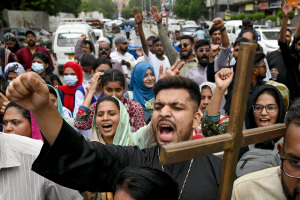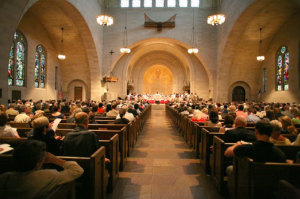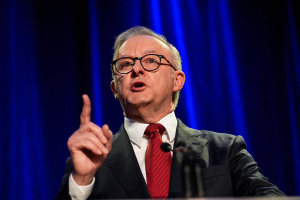FRC scholar blasts declaration from 'religious leaders' denouncing 'religious nationalism'
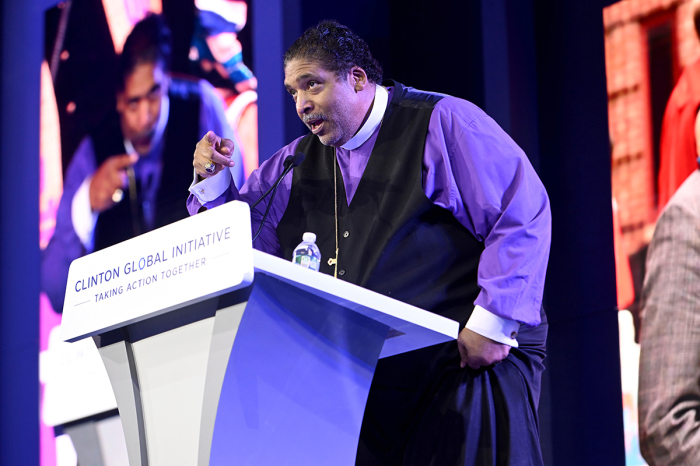
A scholar with the Washington, D.C.-based nonprofit think tank Family Research Council (FRC) criticized the recent New Haven Declaration as the latest example of progressives attempting to smuggle in their agenda under the guise of Christianity, while trying to paint Bible-believing Christians as subversives.
"This is nothing new," David Closson, who serves as director of the Center for Biblical Worldview at FRC, told The Christian Post. "Over the last couple of years, the boogeyman of Christian nationalism has been raised by folks on the progressive Left, from the Biden campaign to people like Bill Maher. I remember after the January 6 incident, they were trying to blame Christian nationalism."
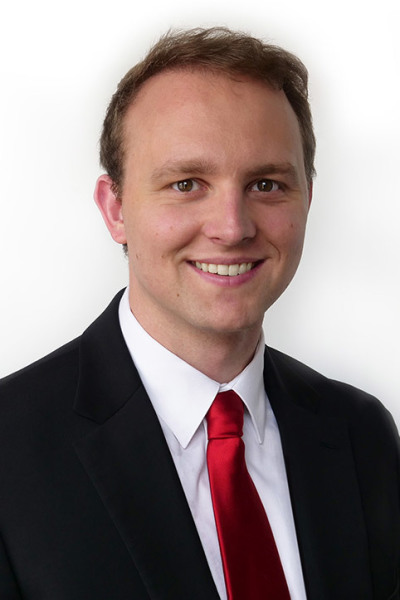
Last week, a group of Christian clergy, theologians and scholars led by progressive activist Bishop William J. Barber II signed the "New Haven Declaration of Moral & Spiritual Issues in the 2024 Presidential Election," which emerged as part of the inaugural conference of the Yale Divinity School’s Center for Public Theology & Policy.
Barber, who founded the school's Center for Public Theology & Policy, appeared throughout Rob Reiner's recent documentary "God & Country," which alleged a creeping "Christian nationalism" in the U.S. that echoes the Third Reich and manifests most blatantly in former President Donald Trump.
In the New Haven Declaration, the self-described religious leaders denounced "distorted religious nationalism," which they claimed "has persuaded many well-meaning Christians to focus on a narrow set of divisive cultural wedge issues while ignoring the real moral issues that are at the heart of our Scriptures and tradition."
The declaration also warned that "a well-funded, coordinated political movement has co-opted our faith tradition and is exploiting so-called 'traditional values' to undermine democracy and divide people across this land," though what those specific "traditional values" are were left undefined.
The signatories further pledged "to launch a season of preaching the moral issues of living wages and union rights, healthcare and ecological justice, an end to the spilling of innocent blood, a re-imagination of criminal justice, and the protection and expansion of voting rights and equal protection guarantees."
Closson, who has been writing about Christian nationalism for years, noted that many of the same people who once used the term "religious right" in previous decades have now pivoted to using the phrase "Christian nationalism," which he said seems to be a tactic intended to silence those who are slapped with the label.
"The phrase seems to simply try to paint those who hold traditional conservative views, informed by the Scripture, as somehow not just outdated or a little odd, but as dangerous subversives who shouldn't even be allowed to participate in the public square," he said.
While he agrees with portions of the New Haven Declaration, Closson suggested that many flashpoint moral issues are conspicuously absent from the document despite their prominence in the Scriptures.
"I totally agree that we need a season of preaching on the moral issues," said Closson. "But when you pick through the issues that they're raising, noticeably there are some very clear issues that the Bible speaks to: the rights of the pre-born, issues related to religious liberty, issues related to the definition of human sexuality and the plethora of LGBT issues."
Regarding the declaration's call for "an end to the spilling of innocent blood," Closson said: "I could get on board with that, but we need to define that, and something tells me they wouldn't want it to define that the same way that I would."
The New Haven Declaration does not define the "divisive cultural wedge issues" by which Christians are allegedly being distracted from "the real moral issues," but Barber suggested in a 2019 interview with Intelligencer that Republicans who believe they have taken the moral position by opposing abortion while supporting gun rights, tax cuts, and school prayer are heretics.
"To suggest that if you’re against abortion, you’re against women’s right to choose, you’re for guns, for prayer in schools, for tax cuts, a Republican, then you have taken the moral position, that is modern-day heresy," Barber said. "And we have to challenge it. But we’re not just going to challenge it just emotionally. We’re saying if you want to have a discussion about morality from a biblical standpoint, then let’s have a real one."
Barber has also come out in support of same-sex marriage, claiming he was consecrated by a lesbian bishop. In 2019, he hosted an event at his Greenleaf Christian Church in Goldsboro, North Carolina, with then-Democratic presidential candidate Pete Buttigieg, during which he claimed Jesus said nothing about homosexuality.
Closson noted there are some issues "where it's 'Thus saith the Lord,' and we don't have to guess what God's opinion is on a topic. Take the issue of abortion, we have Psalm 139:13-16. We have Luke 1:39-45. On the issue of the unborn, we don't have to guess what God's opinion is."
"And yet, I do think people are trying to smuggle a progressive agenda and use this veneer of outrage over Christian nationalism as simply a Trojan horse to continue pushing progressive views, which seems to be exactly what the [New Haven Declaration] was trying to accomplish," he said.
Clossen predicted that the firestorm over Christian nationalism will only intensify as the 2024 presidential election draws closer.
"I think that Christian nationalism, religious nationalism, that phrase is being wielded by the Biden administration, by the Biden campaign as a boogeyman to silence those whose conscience is formed by the Bible," he said.
While there are some Christians who adhere to theonomy and fringe ideas of establishing Old Testament law or some form of theocracy in the U.S., Closson said such people are miniscule compared to the vast majority of American Christians who simply wish to participate in the political process out of a desire to fulfill their biblical duties as a citizen.
"I think that the phrase and the allegations of Christian nationalism are only going to increase, and I really do think the goal behind that movement is to try to intimidate and silence conservative Evangelicals and Catholics from fully participating in the public square," he added.
Jon Brown is a reporter for The Christian Post. Send news tips to jon.brown@christianpost.com

















